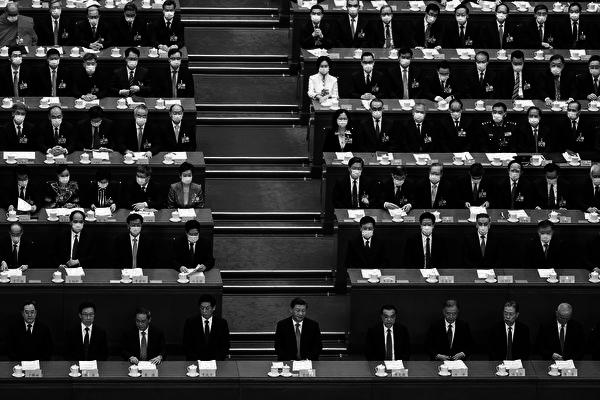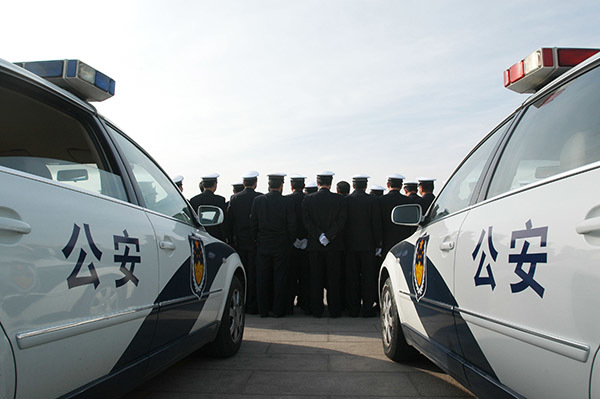On March 5, 2023, CCP leaders attended the opening session of the National People's Congress
[People News] Questions remain about who is truly in control behind the scenes at Zhongnanhai. Although the Chinese Communist Party (CCP) has increasingly signalled that party leaders are losing military and party authority, the visibility of their public activities continues to leave many, especially those unfamiliar with the CCP's internal dynamics, in doubt.
On May 20, the CCP's official media, People's Daily, sent a clear signal. The CCP plans to implement the '14th Five-Year Plan' starting in 2026 and is currently drafting proposals for this plan. On that day, official media reported that Xi Jinping had recently issued important instructions regarding the preparation of the '14th Five-Year Plan,' emphasizing the need to 'adhere to scientific decision-making, democratic decision-making, and legal decision-making, integrating top-level design with soliciting public opinion... to ensure high-quality completion of the planning work.' The headline of the report was 'Adhere to Scientific Decision-Making, Democratic Decision-Making, and Legal Decision-Making to Achieve High-Quality Preparation of the '14th Five-Year Plan.'
When we compare this to the news released by official media in August 2020 titled 'Xi Jinping Makes Important Instructions on the Preparation of the '13th Five-Year Plan,' an anomaly becomes apparent. At that time, Xi Jinping did not mention the three 'decisions' at all, instead emphasising the importance of 'opening the door to solicit opinions, gathering wisdom, and integrating the strengthening of top-level design with soliciting public opinion...'.
Why was this not mentioned five years ago, but is now highlighted five years later? In reality, 'scientific decision-making, democratic decision-making, and legal decision-making' are concepts that originated during the Hu-Wen era, which Hu Jintao and Wen Jiabao referenced multiple times throughout their two terms in office.
In 2003, the work rules of the State Council, led by Wen Jiabao, introduced three principles: 'implementing scientific and democratic decision-making, adhering to the rule of law in administration, and strengthening administrative supervision.' These principles were later included in the 'Outline for Comprehensive Promotion of the Implementation of the Rule of Law in Administration' in 2004. In April 2005, Hu Jintao emphasised at a military committee meeting the need to 'improve and perfect the systems of democratic decision-making, scientific decision-making, and decision-making according to the law.' In March 2006, during an inspection of an Air Force unit, Hu reiterated the importance of these three 'decisions.'
Furthermore, Hu Jintao explicitly mentioned the three 'decisions' in the report of the 17th National Congress of the Communist Party of China in 2007, at the summary meeting of the nationwide in-depth study and practice of the scientific development concept in 2010, and in the report of the 18th National Congress in 2012. In August 2010, during a national conference on the rule of law in administration, Wen Jiabao also addressed the three 'decisions.'
This context helps explain why, during Xi Jinping's leadership, particularly after the 19th National Congress of the Communist Party of China, when his power reached its zenith and the emphasis on 'one leader' became pronounced, the three 'decisions' have been infrequently referenced.
The signs of this shift began to emerge following the rumours about Xi's health during the 3rd Plenary Session of the Communist Party of China last July. On August 10, 2024, the People's Liberation Army Daily and the military network published an article titled 'Adhering to Scientific Decision-Making, Democratic Decision-Making, and Decision-Making According to the Law' in their news section.
The article noted that the 'Textbook on Democratic Centralism,' organised and edited by the Political Work Department of the Central Military Commission, has recently been distributed across the military. 'Adhering to scientific decision-making, democratic decision-making, and decision-making according to the law, and continuously enhancing the quality of decision-making is a significant practical issue that party organisations at all levels must tackle to effectively implement democratic centralism and make good use of the
The article consistently stresses that military decision-making should no longer depend on impulsive or uniform approaches, opposing arbitrary personal directives and 'one-man rule'. Moving forward, the military must commit to scientific and democratic decision-making, as well as adhere to legal frameworks. These assertions starkly contrast with the previous practices of the General Secretary of the Communist Party of China.
During the 20th National Congress of the Communist Party, the General Secretary publicly sidelined Hu Jintao while attempting to consolidate various powers within his own hands, directing various fields and issues. Within the party, it has essentially become a 'one-man rule', with other Standing Committee members largely serving as mere figureheads. In this context, the military has notably highlighted the 'decision-making' principles advocated during the Hu-Wen era and the 'democratic centralism' that has been absent for several years, which is clearly unusual. What else could this indicate if not a significant issue? Would Xi Jinping (Xi Jinping) issue such commands if he were still in power?
Additionally, there are two clear signals recently released regarding the Hu-Wen control bureau: First, before and on the day of the 'May Fourth' Youth Day designated by the Communist Party, state media adopted a rare approach in recent years: prominently praising and encouraging young people. Even the 9th issue of the magazine 'Qiushi', published on April 30 by the Central Committee of the Communist Party, featured five articles related to youth, authored by figures ranging from the General Secretary of the Communist Party to the Central Committee, the Communist Youth League, the Central Youth School, and young students. Such arrangements have been seldom seen in the past five years. This undoubtedly suggests a resurgence of the 'Youth League faction', which had previously been weakened in the political landscape of the Communist Party.
Secondly, on May 15, the Central Committee of the Communist Party and state agencies convened a May Fourth Youth Exchange Conference in Beijing, which has also been infrequent in recent years. This is likely a reflection of Hu-Wen's influence.
In February of this year, overseas independent commentator Cai Shenkun disclosed on the X social platform and YouTube that a friend informed him that Xi Jinping no longer possesses any real authority; the power within the Communist Party has been handed over to three elderly figures from 1942. Furthermore, military power is held by Zhang Youxia, while Xi's role as Chairman of the Central Military Commission is merely a title. 'Xi Jinping's resignation is just awaiting an official announcement, likely to occur at the Fourth Plenary Session, and it will not extend beyond next year.' Cai Shenkun later identified these three elderly figures as Hu Jintao, Wen Jiabao, and Hu Deping.
Recent signals released over the past month strongly indicate the control of Hu and Wen; otherwise, the initiatives promoted during the Hu-Wen era and the activities of the Youth League faction would not be so prominently displayed.
(This was first published by People News)











News magazine bootstrap themes!
I like this themes, fast loading and look profesional
Thank you Carlos!
You're welcome!
Please support me with give positive rating!
Yes Sure!